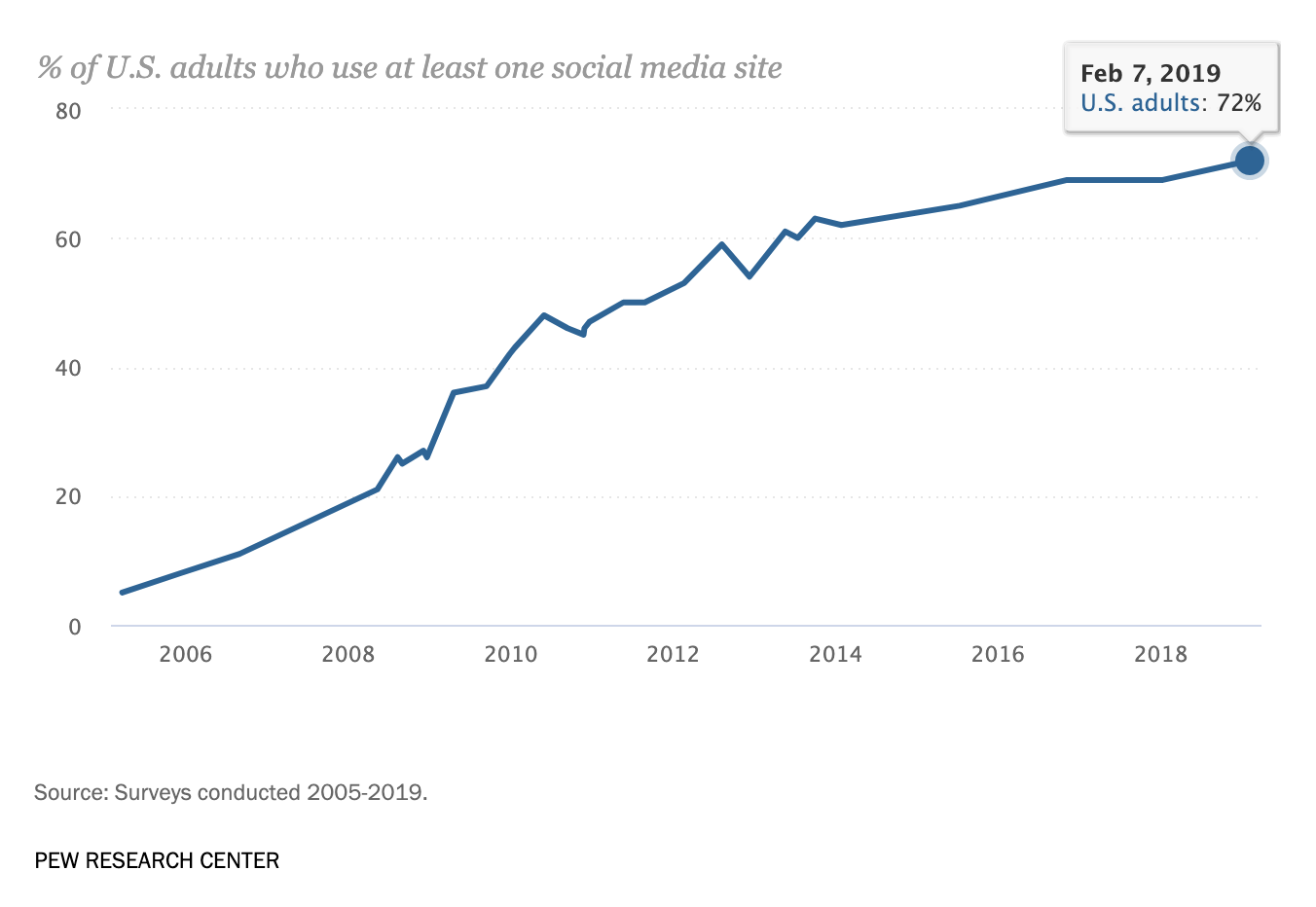Since the introduction of social networks like Facebook, Twitter, and Instagram in the early 2000’s, companies large and small have been using these platforms to expand their customer reach. Until 2007 companies were only able to use them to garner an audience organically by creating business pages and driving traffic there.
This all changed when Facebook CEO, Mark Zuckerberg, announced that Facebook would begin running ads on their platform. Soon after, other prominent social media platforms like Twitter and Instagram followed suit and began selling ads that would show to their users.
Social media has never been the same and neither has the way that businesses use these platforms to gain customers.
Who should use social ads?
Social ads have become particularly important for ecommerce stores.
One of the biggest indicators of whether or not a consumer will buy a product for ecommerce stores is how easily and efficiently can they move from learning about the product to buying it. With the advent of social ads, ecommerce companies are able to consolidate their marketing and sales processes into just a few easy clicks.
Companies in the housing industry including realtors, construction companies, developers, and home buyers all can also benefit from running social ads. They are able to show several facets of houses and properties that would be difficult to showcase in traditional advertising. With call-to-action buttons on social ads, these companies are then able to much more effectively get quality leads of consumers who are interested in their home or property.
For these reasons and more many, other types of companies like B2B businesses, law firms, restaurants, landscapers, and outdoors companies can benefit from running social ads.
One of the key reasons that these types of companies can benefit from social ads is due to the advent of targeted advertising. When users interact on social media platforms like Facebook and Instagram they like posts, pages, create statuses, and join groups.
Facebook collects all of this data and offers it to advertisers. So, whenever an advertiser wants to run an ad on Facebook or Instagram, they can target that ad to people who are much more likely to purchase due to their interests, hobbies, jobs, etc.
Here are three reasons why your business should consider running social ads:
1) 72% of US Adults Use Social Media
Social media platforms have done a miraculous thing by convincing nearly three quarters of the American population to sign up as users on their websites.
With the exception of search ads, no other avenue of advertising can assure companies that such a large population of potential customers will see their advertisement.
Users above the age of 30 are much more likely to actively use Facebook, while users under 30 are more likely to use Instagram. One of the benefits of both of these social media platforms being owned by the Facebook corporation is that advertisers can engage both platforms on one ads manager account. With Facebook’s targeted advertising capabilities, companies can drill down exactly who they want to see their ads.

Some of the filters that Facebook uses to drill down an ad’s audience:
-
Geography
-
Demographic
- Age
- Sex
- Race
- Income
-
Jobs, Interests, and Page Likes
- This is some of the most useful information that Facebook provides to advertisers because here you can target not only based on characteristics of people, but based on their buying habits.
- For example, local restaurants can target users who are interested in local cuisine. If they are a seafood restaurant, then they could target users who often talk about seafood on social media. Or, say that your company is a commercial landscaping company looking to contract with entrepreneurs and small business owners to landscape the exterior of new storefronts. With Facebook ads, this company could target users who work in small businesses, are self-employed, etc.
2) Facebook Offers Excellent Analytics and Controls
The data that Facebook provides to ad managers is not just data describing users that might see the ad. Ad managers are also able to see how ads are performing throughout the life of the ad.
Using this tool, advertisers have access to numerous metrics pertaining to the performance of their ads.

Bid Strategy
Facebook allows advertisers to choose how they want their ads to bid on ad placements based on the objective of the campaign. These strategies are:
-
Lowest Cost
- Lowest cost ensures that the entire budget will be spent, giving the advertiser the most results for their set budget.
-
Bid Cap
- This sets a maximum on the amount of money that an advertiser is willing to spend on each bid.
-
Target Cost
- When using this bid strategy, Facebook will bid within a 10% window for each result of your desired bid amount per result.
-
Highest Value
- If an advertiser is looking to get maximum return on ad spend (ROAS) for a particular ad set, they will choose this bid strategy.
-
Minimum ROAS
- This ad spending method allows advertisers to dictate the minimum amount of ROAS for each result that Facebook can bid on for a particular ad set.
Budget
Advertisers set their campaign and ad set budget. This option on the dashboard allows the ad manager to change the budget based on the performance of the ad in order to attain the maximum return on ad spend (ROAS).
Results, Reach, and Impressions
Facebook Analytics gives advertisers real time data on how their ads are performing. Not only can businesses see how frequently their ad is shown, but they can also dictate which results to optimize their ad delivery for. This is determined by the objectives set by the advertiser.
If a campaign is optimized for app downloads, then the dashboard will show how many times the app was downloaded because of the ad. Or if an ecommerce business is running an ad campaign to increase website purchases, then Facebook will report all of the purchases that are attributed to the campaign.
3) Targeted Objectives
Targeted objectives give ad managers the ability to deliver their ads to individuals who are most likely to take the action that the business desires, rather than merely placing advertisements and hoping people will view them.
Facebook categorizes ad objectives into three groups:
Awareness
- Brand Awareness
- Reach
Consideration
- Traffic
- Engagement
- App Installs
- Video Views
- Lead Generation
- Messages
Conversions
- Conversions
- Catalog Sales
- Store Traffic
In traditional advertising businesses are able to place ads in one physical location without regard to how people are likely to react to the ads. With targeted objectives on Facebook Ads Manager, businesses can instruct Facebook to show their ads to users who are most likely to take the action that the company desires. If companies know how to rightly use these features, they can increase the return of their ad spend dramatically.
Here’s how that works:
- When creating an ad campaign, advertisers will set the budget, audience, and campaign objectives.
- Then, based on these entries, Facebook will create projections for your campaign.
- If a company sets an ad spend of, say, $100 with an objective to drive traffic, Facebook may predict that this will give the company’s site 300 visitors and 4% of these visitors will fill out contact forms.
- Because of the accuracy of these predictions a company can, in effect, spend $100 and be highly likely to receive at least 12 quality leads that will pay dividends on their investment in this social campaign!
Social ads can be one of the most cost effective ways to market your business. And because social media doesn’t seem to be going anywhere anytime soon, businesses will do well to advertise on social platforms like Facebook and Instagram.
Are you a business looking to increase revenue by using social ads? Contact the V3 team and find out how we can help you reach your revenue goals through social ads.
